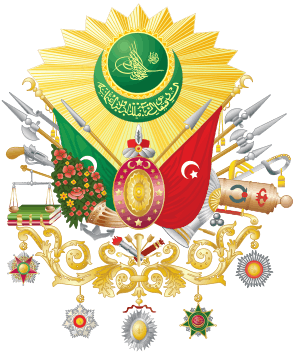Sanjak of Nicopolis
| Sanjak of Nicopolis Niğbolu Sancağı Никополски санджак | |||||
| sanjak of the Ottoman Empire | |||||
| |||||
|
Coat of arms | |||||
| Capital | Nikopol in modern day Bulgaria | ||||
| History | |||||
| • | Battle of Nicopolis | 1396 | |||
| • | Disestablished | 1878 | |||
| Today part of | Bulgaria | ||||
The Sanjak of Nicopolis (Bulgarian: Никополски санджак Nikopolski sandzhak, Turkish: Niğbolu Sancağı) was a sanjak in the Ottoman Empire, with Nikopol in modern Bulgaria as its administrative centre. It was established out of the territories of the Tsardom of Vidin, after the Battle of Nicopolis in 1396.
Administration
The earliest defter of the Sanjak of Nicopolis is composed in the mid-15th century. One group of scholars dated this defter to 1430 while another group of scholars dated it to 1479/1480.[1] This was the first Ottoman defter which mentioned the Romani people, who lived in 431 households, or 3.5 percent of households in this sanjak.[2]
Administrative division
In the collected notes of Evliya Çelebi (mid-17th century) the Sanjak of Nicopolis with 20 ziamets and 244 timars and income of 40,000 aspres was mentioned as one of 24 Ottoman sanjaks in Rumelia.[3] In the mid-19th century it had 15 kadiluks.[4]
Sanjak-beys
Bulgarian historian Rusi Stojkov believed that Skanderbeg was mentioned in 1430 Ottoman defter as a sanjak-bey of the Sanjak of Nicopolis.[5] According to this view he was appointed to this position shortly after being chosen for the position of sanjak-bey of the Sanjak of Dibra. Halil İnalcık explained that for Skanderbeg, "this was a big promotion as Nikopol was one of the largest sanjaks of European Turkey".[6] Strashimir Dimitrov dated this defter to 1479–80 and believed that the Iskander Bey mentioned in it was not Skanderbeg but some other person who was mirliva of Nicopolis.[7]
During the reign of Sultan Murad II the sanjak-bey was Mehmed Bey, a son of Firuz Bey.[8]
In March 1834 Husseyn Pasha was appointed as sanjak-bey of the Sanjak of Nicopolis and Sanjak of Vidin.[9]
Economy
The Sanjak of Nicopolis was one of six Ottoman sanjaks with most developed shipbuilding (besides sanjaks of Smederevo, Vidin, Požega, Zvornik and Mohač).[10]
References
- ↑ Цветкова, Бистра Андреева; Мутафчиева, Вера П; науките), Институт за история (Българска академия на (1966). Търски извори за българската история: серия XV-XVI. изд. Българската академия науките. pp. 161–334.
- ↑ Marushiakova, Elena (2001). Gypsies in the Ottoman Empire: A Contribution to the History of the Balkans. Univ of Hertfordshire Press. p. 27. ISBN 978-1-902806-02-0.
The first mention of Gypsies in the tax documentation of the Ottoman Empire dates from 1430 and is found in the Register of Timars for the Nikopol sanjak or region, in which 431 Gypsy households are registered, 3.5% of the total listed.
- ↑ Çelebi, Evliya; Hammer-Purgstall, Joseph Freiherr von (1834). Narrative of Travels in Europe, Asia, and Africa in the Seventeenth Century. Oriental Translation Fund. p. 98.
- ↑ Smedley, Edward; Rose, Hugh James; Rose, Henry John (1845). Encyclopaedia metropolitana: or Universal dictionary of knowledge...comprising the twofoldadvantage of a philosophical and an alphabetical arrangement, with appropriate engravings. B. Fellowes. p. 149.
This Sanjdk contains fifteen Kddiliks, the chief of which Nicopolis.
- ↑ Bulletin de la Société historique bulgare. Izd-vo na Bŭlgarskata akademii︠a︡ na naukite. 1968. p. 242.
...преди няколко години от Р. Стойков мнение, че описът на хасовете, зеа- метите и тимарите в Никополския санджак е от 1430 г. и че споменатият в него Искандер бей бил идентичен с албанския национален герой Скен- дербег,
- ↑ Kiel, Machiel (1990). Ottoman architecture in Albania, 1385-1912. Research Centre for Islamic History, Art and Culture. pp. 173, 187. ISBN 978-92-9063-330-3.
Skanderbeg,... of Kruja between 1438 and 1440, after which date he was promoted to the rank of sanjak-bey of Dibra (Debar) and shortly afterwards to the important Nikopol in Northern ... 7) Inalcik, article Arnavudluk in E.I. In fact this was a big promotion as Nikopol was one of the largest sanjaks of European Turkey
- ↑ naukite), Institut za balkanistika (Bŭlgarska akademii︠a︡ na (1970). Poredit︠s︡a "Balkani". p. 15.
... в който се споменава Искандер бей, мир-лива на Никопол. Този регистър се оказва не от първата половина на XV в., а от 1479 — 1480 г. и споменатият в. него Искандер бей няма нищо общо с Г. Кастриоти
- ↑ Lewis, Bernard (1974). Islam, from the Prophet Muhammad to the Capture of Constantinople: Politics and war. Harper & Row. p. 142.
The bey of the Sanjak of Nicopolis, Mehmed Bey, the son of Firuz Bey, ...
- ↑ sir Grenville Temple (1836). Excursions in the Mediterranean. p. 277.
Husseyn pasha confirmed to the sanjaks of Widin and Nicopolis, and to the command of the fortress of Widin
- ↑ Godis̆njak grada Beograda. Beogradske novine. 1979. p. 35. Retrieved 7 September 2013.
Ипак градња бродова се посебно везивала за шест санџака: никопољски, видински, смедеревски, зворнички, пожешки и мохачки.
